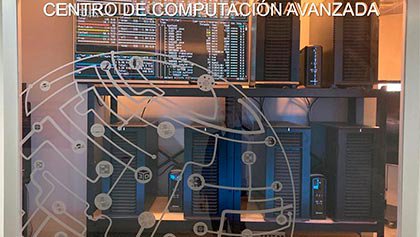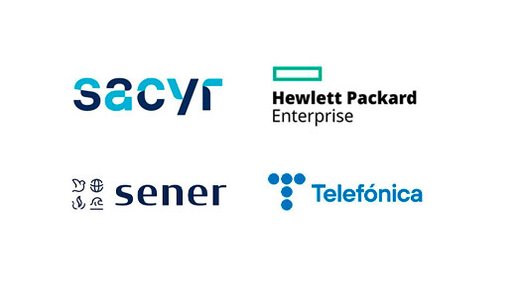Bachelor’s Degree in Cybersecurity
The Bachelor’s Degree in Cybersecurity is a university degree aimed at training professionals to be able to detect and mitigate threats, thereby guaranteeing security in complex digital environments within companies. Throughout your training you will learn to master the key aspects of IT, Network Security and Cyber Resilience, to become one of the most in-demand profiles in the digital sector.
It stands out for its practical training where you will have the opportunity to specialise in secure software, cryptography, mathematical principles and ethical hacking, to be able to anticipate real threats, assess their legal and ethical impact, and lead strategic responses. What’s more:
- You will learn how to use real pentesting, forensic analysis and cryptography tools to be able to detect and correct vulnerabilities.
- You will design secure infrastructures with Zero Trust Security, such as protection against DDoS attacks and Identity and Access Management using IAM.
- You will be trained in risk management, raising awareness of emerging threats and managing advanced protection of digital environments.
- You will learn to lead in digital security by integrating cyber intelligence, cyber resilience and crisis management.
Your career in cybersecurity starts here, with access to cutting-edge technologies, real projects and a professional environment connected to the world.
Official degree issued by Universidad Europea de Madrid
| Campus-based | Villaviciosa de Odón | 4 years, 240 ECTS | Start: September 2026 | School of Architecture, Engineering, Science and Computing - STEAM |
Live your passion and design your future in our state-of-the-art facilities
Get certified while you study and open doors around the world!
During your Bachelor’s Degree in Cybersecurity, you will not only learn to program and design systems, but you will also obtain official internationally recognised certifications. With exclusive access to the Cisco Networking Academy and official Amazon Web Services content, you will be prepared to excel in a global marketplace from your very first year.
- Introduction to Networks: you will learn the fundamentals that underpin the Internet, understanding how systems connect and communicate on a global scale.
- Switching, Routing & Wireless Essentials: you will master the technologies that make modern connectivity possible, from home networks to company infrastructures.
- Enterprise Networking, Security & Automation: you will be prepared to design and protect complex networks, integrating automation, scalability and cybersecurity.
- CCNA (Cisco Certified Network Associate) certification: you will gain one of the most valued certifications in the sector, which will validate your skills and differentiate you professionally from the very beginning.



Learn with the tools leading the way in real cybersecurity
Be part of the future of cybersecurity by working with real technologies, the same ones used by professionals in the sector.
Environments and tools you will use:
- Programming and development: Visual Studio, Eclipse, Argo UML, Anaconda Python, NetBeans, Java JDK.
- Databases and analysis: Mongo DB, DB Browser, Hadoop, VirtualBox, Tensor Flow.
- Cryptography and anonymity: VeraCrypt, CipherShed, OpenSSH, OpenSSL, Tor, OpenVPN, Stunnel.
Technologies you will master:
- Pentesting and threat detection: Metasploit, Sqlmap, Nessus, Nmap, Core Impact, OpenVAS
- Ethical hacking and forensic analysis: Wireshark, Tcpdump, Maltego, Encase, Sleuth, Helix
- Network and traffic security: Aircrack-ng, Kismet, Ettercap, Dsniff, Fiddler, SSLstrip, Netsparker
Here you don't just learn how to use tools: you learn to think like a cybersecurity professional.
Study plan
Master digital security from scratch and be ready to protect the future
Throughout the Bachelor’s Degree in Cybersecurity you will acquire comprehensive technical training, with a legal, strategic and ethical vision, which will make you an expert who can anticipate, detect and neutralise real threats in an increasingly complex digital world.
Study plan structure
PRIMER CURSO
| Materia | ECTS | Tipo | Idioma de impartición |
|---|---|---|---|
| Álgebra | 6 | BÁSICA | Español (es) |
| Análisis matemático | 6 | BÁSICA | Español (es) |
| Lógica | 6 | BÁSICA | Español (es) |
| Empresa y legislación | 6 | BÁSICA | Español (es) |
| Fundamentos de programación | 6 | BÁSICA | Español (es) |
| Estadística y optimización | 6 | BÁSICA | Español (es) |
| Principios jurídicos básicos aplicados a la ciberseguridad | 6 | BÁSICA | Español (es) |
| Programación con estructuras lineales | 6 | OBLIGATORIA | Español (es) |
| Redes de ordenadores | 6 | BÁSICA | Español (es) |
| Dimensiones de la Seguridad | 6 | BÁSICA | Español (es) |
SEGUNDO CURSO
| Materia | ECTS | Tipo | Idioma de impartición |
|---|---|---|---|
| Técnicas de programación avanzadas | 6 | OBLIGATORIA | Español (es) |
| Programación orientada a objetos | 6 | OBLIGATORIA | Español (es) |
| Programación concurrente y distribuida | 6 | OBLIGATORIA | Español (es) |
| Arquitectura de computadores | 6 | OBLIGATORIA | Español (es) |
| Criptografía | 6 | OBLIGATORIA | Español (es) |
| Sistemas operativos | 6 | OBLIGATORIA | Español (es) |
| Bases de datos | 6 | OBLIGATORIA | Español (es) |
| Técnicas de Hacking | 6 | OBLIGATORIA | Español (es) |
| Metodologías de desarrollo seguro | 6 | OBLIGATORIA | Español (es) |
| Metodologías de gestión de proyectos | 6 | BÁSICA | Español (es) |
TERCER CURSO
| Materia | ECTS | Tipo | Idioma de impartición |
|---|---|---|---|
| Ingeniería del software | 6 | OBLIGATORIA | Español (es) |
| Grandes volúmenes de datos | 6 | OBLIGATORIA | Español (es) |
| Redes avanzadas y computación en la nube | 6 | OBLIGATORIA | Español (es) |
| Diseño y análisis de algoritmos | 6 | OBLIGATORIA | Español (es) |
| Proyecto de ingeniería I | 6 | OBLIGATORIA | Español (es) |
| Inteligencia artificial | 6 | OBLIGATORIA | Español (es) |
| Seguridad en base de datos | 6 | OBLIGATORIA | Español (es) |
| Seguridad en redes | 6 | OBLIGATORIA | Español (es) |
| Desarrollo seguro de web y apps | 6 | OBLIGATORIA | Español (es) |
| Proyecto de ingeniería II | 6 | OBLIGATORIA | Español (es) |
CUARTO CURSO
| Materia | ECTS | Tipo | Idioma de impartición |
|---|---|---|---|
| Análisis y Gestión del Riesgo | 6 | OBLIGATORIA | Español (es) |
| Malware y amenazas dirigidas | 6 | OBLIGATORIA | Español (es) |
| Auditoría | 6 | OBLIGATORIA | Español (es) |
| Pentesting | 6 | OBLIGATORIA | Español (es) |
| Proyecto de ingeniería III | 6 | OBLIGATORIA | Español (es) |
| Regulación y gobernanza de la seguridad | 6 | OBLIGATORIA | Español (es) |
| Prácticas Externas | 6 | PRÁCTICAS | Español (es) |
| Trabajo Fin de Grado | 6 | TFG | Español (es) |
| Ética y eficacia profesional | 6 | OPTATIVA | Español (es) |
| Liderazgo y Emprendimiento | 6 | OPTATIVA | Español (es) |
| Prácticas Profesionales II | 6 | OPTATIVA | Español (es) |
| Actividades Universitarias | 6 | OPTATIVA | Español (es) |
What you will learn course by course
1
First year
- You will acquire a solid foundation in programming, mathematics and logic, learning to think with structure to solve complex problems.
- You will understand how systems and networks work, and why they are vulnerable in connected environments.
- You will discover the role of ethics and legislation in cybersecurity and how they influence data protection and decision-making.
- You will get a general overview of the current landscape of IT security.
2
Second year
- You will further explore advanced programming, learning how to build more secure and efficient applications.
- You will learn how to protect information using cryptography and data security techniques.
- You will start working with real ethical hacking tools to detect vulnerabilities.
- You will learn methodologies to securely manage technological projects from the start.
3
Third year
- You will apply secure by design principles to create resilient and reliable software.
- You will learn how to protect Big Data and cloud computing environments, key to modern cybersecurity.
- You will explore cyberintelligence and techniques to analyse data and anticipate threats.
- You will work on real projects, facing situations that simulate the professional environment.
4
Fourth year
- You will study how to respond to advanced attacks, malware and critical situations.
- You will perform audits and penetration tests in real environments.
- You will understand how security is managed in organisations, complying with regulations such as the GDPR or ISO 27001.
- You will apply your knowledge in professional internships and demonstrate everything you have learnt with your final degree project.
- You will strengthen your leadership and ethical decision-making skills, with a strategic vision of your professional future.
Take the leap into the real world with internships at leading companies
Professional internships are your first direct contact with the sector, an opportunity to apply your knowledge in real environments and discover how cybersecurity is experienced from the inside. During the degree, you can complete up to 12 ECTS credits of curricular internships (300 hours) in leading companies regarding technological innovation.
You will be part of real projects and collaborate with experts in over 200 partner companies, which will allow you to grow, learn and start building your professional network from day one.
Among the collaborating organisations are names such as INDRA, NTT Data, Deloitte, IBM, Telefónica, Banco Santander, Accenture, El Corte Inglés, Repsol and Mapfre. Your career starts here, working where the decisions that protect the digital world are made.










More information
Programme implementation
2022/2023.
Number of places for incoming students
60.
Internships
- INDRA,NTT Data
- Deloitte
- IBM
- Telefónica
- Banco Santander
- Accenture
- El Corte Inglés
- Repsol
- Mapfre y + 200 otras empresas
Degree competencies
Competencies
- CP01 – Design, develop, test and deploy secure components and elements, ensuring their reliability, safety, and quality, in accordance with ethical principles and current legislation and regulations.
- CP02 – Plan and deploy IT projects, services, and systems across all domains, leading their implementation and continuous improvement while assessing their economic and social impact.
- CP03 – Develop and deploy applications, taking into account the characteristics, functionalities, and structure of the Internet and the cybersecurity risks they entail.
- CP04 – Select, develop, deploy, and use secure applications, services, and network-based protocols that meet the requirements of specific applications.
- CP05 – Design, develop, and maintain techniques and solutions for data protection (stored, processed, or in transit), ensuring privacy at all times.
- CP06 – Apply acquired knowledge, skills, and competences in an integrated and practical manner within professional environments related to cybersecurity.
- CP07 – Prepare, present, and defend an original final degree project that synthesizes the competences acquired throughout the program.
- CP08 – Identify, analyze, and detect cyber incidents or anomalous events, including the attack mechanisms used in such incidents, such as malware.
- CP09 – Select the most appropriate type of audit for each context, carry out such audits using the most suitable tools, and analyze the results to draw relevant conclusions.
- CP10 – Apply and analyze cryptography-based principles and techniques that ensure the confidentiality, integrity, and availability of IT systems and information, as well as the authentication and authorization of their entities.
- CP11 – Identify and assess risks and threats within an organization in all aspects related to cybersecurity.
- CP12 – Generate new ideas and concepts based on known ideas and concepts, reaching conclusions or solving problems, challenges, and situations in an original way.
- CP13 – Communicate messages (ideas, concepts, emotions, arguments), both orally and in writing, strategically aligning the interests of the various parties involved in communication.
- CP14 – Use information and communication technologies for data search and analysis, research, communication, and learning.
- CP15 – Influence others to guide and lead them toward specific objectives and goals, considering their viewpoints, especially in situations derived from volatile, uncertain, complex, and ambiguous (VUCA) environments in today’s world.
- CP16 – Cooperate with others in achieving a shared goal, actively participating with empathy, active listening, and respect for all team members.
- CP17 – Integrate analysis with critical thinking in evaluating different ideas or possibilities and their potential errors, based on evidence and objective data leading to effective and valid decision-making.
- CP18 – Adapt to adverse or unexpected situations that cause stress—whether personal or professional—overcoming them and even turning them into opportunities for positive change.
- CP19 – Demonstrate ethical behavior and social commitment in professional activities, as well as sensitivity to inequality and diversity.
Skills
- HAB01 – Solve mathematical problems that may arise in engineering by applying knowledge of linear algebra, differential and integral calculus, numerical methods, numerical algorithms, statistics, and optimization.
- HAB02 – Apply basic knowledge of the use and programming of computers, operating systems, databases, and software relevant to engineering.
- HAB03 – Analyze the concept of a company, its institutional and legal framework, and recognize basic systems of business organization and management.
- HAB04 – Apply basic algorithmic procedures of information technologies to propose problem-solving approaches, analyzing the suitability and complexity of the proposed algorithms.
- HAB05 – Apply principles, methodologies, and software engineering life cycles, especially those models used primarily for secure software development.
- HAB06 – Apply cybersecurity architectures and models.
- HAB07 – Analyze types of malware according to their infection vector, propagation, replication, and protection mechanisms, as well as their objectives.
- HAB08 – Carry out projects in the field of technologies specific to Cybersecurity Engineering.
- HAB09 – Apply the acquired knowledge in a professional environment.
- HAB10 – Demonstrate leadership and ethical commitment in solving cybersecurity problems.
Knowledge
- CON01 – Acquire the basic concepts of discrete mathematics, logic, algorithms, and computational complexity for solving engineering problems.
- CON02 – Recognize the structure, organization, operation, and interconnection of computer systems, as well as the fundamentals of programming for solving engineering problems.
- CON03 – Describe the most suitable data types and structures for problem-solving.
- CON04 – Explain the structure and architecture of computers, as well as the functionalities and structure of the operating systems running on them.
- CON05 – Recognize the security implications of developing, deploying, and using network-based applications and services, including the Internet, web, e-commerce, multimedia, interactive services, social networks, mobile computing, and the Internet of Things.
- CON06 – Describe the concept of cybersecurity and its fundamental pillars and implications in today’s globalized, technological, and connected context.
- CON07 – Identify the most important public-key and private-key cryptographic algorithms, as well as their applications in cybersecurity.
- CON08 – List the stages or steps that attackers follow to construct their attacks, as well as the most serious and significant attack patterns and offensive security environments.
- CON09 – Examine national and international legislation applicable to cybersecurity and its professionals, as well as the concept of cybercrime, its business model, and its implications.
Faculty
Our teaching staff
- Marina Delgado Romero
PhD and Materials Engineer from the Polytechnic University of Madrid. Experience in research centers and companies related to the photovoltaic and aeronautical sectors, among others. She has been part of the teaching staff at Universidad Europea since 2023. - Antonio Rodríguez Suárez
PhD from the University of Oviedo. Telecommunications Engineer. ANECA Research Accreditation (Sexenio). Publications on fuzzy logic and mathematical models for decision-making. Experience in project management within both public and private companies. PMP-certified. Accredited evaluator for various UNESCO codes. Member of COIT and PMI. - Gonzalo Blázquez Gil
PhD in Computer Engineering from Universidad Carlos III de Madrid (2015), where he also completed a Master’s in Science and Technology. He trained as a researcher in the Applied Artificial Intelligence Group (GIAA) of the same university. His main areas of specialization are Activity and Emotion Recognition, Context-Based Systems, and Machine Learning. He carried out research stays in international centers, earning the International Mention in his PhD. He has been involved in the preparation and development of numerous technology implementation projects with some of the most prominent companies in the sector and has taught several courses in both the current Computer Science Degree and the former Computer Engineering program. He has participated in projects related to UAVs, GIS, Big Data, and Cyber-Physical Systems in various fields. - Alberto López González
Telecommunications Engineer from the Polytechnic University of Madrid (UPM). Over 25 years of experience in the private sector, working for companies such as Telefónica and Mastercard. Expert in mobile communications, cybersecurity, and applied artificial intelligence. Official speaker at numerous national and international events and conferences. 12 years of teaching experience at university level, both undergraduate and postgraduate. - Enrique de Miguel Ambite
Engineering and Consulting professional specializing in the IT sector, with 22 years of experience in projects linked to Digital Transformation. University PhD Candidate and Researcher at a Technology Center with over 20 years of teaching experience in the areas of Telematic Engineering, Computer Science, Applied Economic and Social Sciences, Automatic Engineering, and Mathematics. Dedicated to teaching and research as a Professor, Researcher, Final Project Supervisor, Master’s Thesis Director, Coach, and Mentor for graduates and entrepreneurs. His areas of interest, teaching, and research include Applied Artificial Intelligence, Cybersecurity, and Blockchain. - Ramón Rizo Gómez
PhD in Psychology from the University of Valencia. Bachelor’s Degree in Law. Master’s Degrees in Legal Practice, Data Protection, Transparency and Access to Information. Advanced Course in Judicial Police, Diplomas in Military Psychology and Forensic and Criminological Sciences. Certified DPO. Security Director. Several CCN-CERT courses. Civil Guard Officer (R), Deputy DPO of the Civil Guard (2018–2024). - Jorge Moratalla Collado
PhD in Computer Science and Head of the Innovation Area at the public company Red.es, where he leads technological transformation initiatives in the fields of Big Data and Artificial Intelligence. Holds an MBA specializing in ICT Management and several master’s and postgraduate degrees in disruptive technologies. Teaching experience at various public and private universities. He has participated in several research projects related to emerging technologies and has published multiple works on digital transformation. - José Javier Ruiz
Telecommunications Engineer. 20 years of professional experience in project management for ICT and operational process optimization companies. Member of the teaching staff at Universidad Europea since 2018. Responsible for management and coordination of university programs. - Andrés Soto Villaverde
PhD in Computer Science from the University of Castilla-La Mancha. Bachelor’s Degree in Mathematics from the University of Havana. Has served as Professor of Computer Science at the University of Havana, Simón Bolívar University, Andrés Bello Catholic University, Autonomous University of Carmen, Berlin School of Economics and Law (HWR Berlin), Doctoral Advisor and Reviewer at Humboldt International University, Adjunct Professor at the International University of Valencia and Universidad Europea de Madrid, Spain. Data Scientist for various commercial companies since 2012. - Jesús Rosa Bilbao
PhD in Computer Engineering from the University of Cádiz (UCA) since 2023. Graduated in Computer Engineering with a specialization in Software Engineering from UCA in 2019. He also earned a Master’s in Cybersecurity from UCA, a Master’s in Project Management and a Master’s in Business Administration from the European Business School of Barcelona (ENEB) in 2020, and a Master’s in Big Data and Business Intelligence from ENEB in 2021. His research interests include complex event processing, event-driven service-oriented architecture, model-driven development, blockchain, and cybersecurity. - [Unnamed Profile — likely continuation of previous paragraph]
PhD in Computer Science from the Polytechnic University of Madrid. Has taught 22 different courses over 19 academic years in various degree programs. Author of 43 papers published in international and national journals and conferences. Participation and leadership in several competitive and non-competitive research projects. Two research periods recognized by CNAI. IT Director and BI Manager at a travel wholesaler company.
Study at a university that offers you the quality you deserve.
5
First private university to obtain 5 Stars in all 10 categories of the QS Stars Rating.
30
A long history of commitment to building the future of higher education.
130,000
We have a community of more than 130,000 alumni from all over the world.
Top 5
We are in the ‘Top 5’ of the best private universities in Spain according to El Mundo.
Admissions
Start your future at Universidad Europea
You can become a student at Universidad Europea in three easy steps.
1
Admission exams
Start your admission process by calling +34 917407272 or request information and our advisors will contact you.
2
Place reservation
Once you have been admitted, secure your place by paying the reservation fee.
3
Enrollment
Submit the required documents to formalise your enrollment.
Scholarships and financial aid
We want to help you. If you want to study at the Universidad Europea, you will have at your disposal a wide selection of own and official scholarships.
Credit recognition and transfers
You don’t have to stick with something you don’t like. That’s why we’ve designed specific plans for credit recognition and transfers.
Request your online credit recognition review, transfer your academic file and start studying at Universidad Europea.
Excellence endorsed by the best
Frecuently Asked Questions
What is a degree in cybersecurity?
A degree in cybersecurity is an academic programme designed to teach students how to protect computer systems, networks and data against cyber threats. Among the subjects studied in this engineering programme are cryptography, network security, digital forensics, web application security and information security management. Students learn to identify vulnerabilities, implement security measures, and respond to security incidents, including the legal and ethical aspects of internet security. After completing a degree in cybersecurity, graduates can work as security analysts, security engineers, cybersecurity consultants, and systems auditors.
What are the most relevant certifications in the field of cybersecurity?
Among the most relevant certifications in cybersecurity are CISSP (Certified Information Systems Security Professional), CEH (Certified Ethical Hacker), CompTIA Security+, and CISA (Certified Information Systems Auditor), among others. These certifications are internationally recognised and demonstrate competence in specific areas of cybersecurity.
What does a cybersecurity engineer do?
The duties of a cybersecurity engineer are based on protecting organisations' information systems and networks against security threats and vulnerabilities. Their main responsibilities include:
- Designing security systems
- Risk assessment and vulnerability analysis
- Implementing security policies
- Maintaining and updating systems
- Incident response
What is the profile of a cybersecurity student?
The profile of a cybersecurity student typically includes a strong interest in technology and information security, analytical and problem-solving skills, and a curious and proactive mindset. In addition, students studying cybersecurity often have programming skills, solid computer science knowledge, and an understanding of the fundamental principles of cybersecurity.











